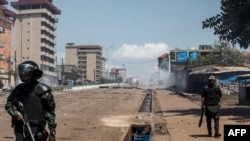Guinea's ruling junta has rejected a UN call to lift a ban on political demonstrations, insisting protests should only be allowed during the election period in three years' time.
The military overthrew President Alpha Conde in September and last month declared a ban on public demonstrations before a return to civilian rule, which it says will be in three years.
The UN's Human Rights High Commission on Monday called for the ban to be revoked, but the junta rejected the appeal late Tuesday.
"No march will be authorised so long as public order cannot be guaranteed" in such events, it said in a communique read on state TV.
Hundreds of people died during violent protests that erupted during the Conde era, the junta noted.
The junta said it had already set up bodies where "contradictions and misunderstandings can be debated quite serenely."
"As a result, nothing can justify marches during this sensitive period of national life in which Guineans have (begun once more) to speak to each other like brothers," the statement said.
Political parties are becoming increasingly vocal in their protests against the junta's rule and what they say is the crackdown on freedoms.
The National Front for the Defense of the Constitution (FNDC), a coalition that led months of anti-Conde protests in 2019 and 2020, issued a statement on social media accusing the junta of showing a "dictatorial attitude."
It called on the public to "mobilise for the imminent resumption of peaceful and civil demonstrations... to prevent the confiscation of power and demand a swift return to public order."
The junta is made up of army officers led by Colonel Mamady Doumbouya.
Its plan for a three-year transition period is in defiance of regional partners in the Economic Community of West African States (ECOWAS).
The West African bloc suspended Guinea's membership after the coup and in March warned of economic and financial sanctions if the junta snubbed an appeal for a shorter transition period.
The issue is set to return to the agenda at an ECOWAS summit on Saturday in Accra, the capital of Ghana.
Meanwhile, a special anti-corruption court on Tuesday ordered three former Conde ministers who were charged in April with suspected embezzlement to be maintained in custody.
They are former prime minister Ibrahima Kassory Fofana; former defense minister Mohamed Diane; and former Environment Minister Oye Guilavogui.






